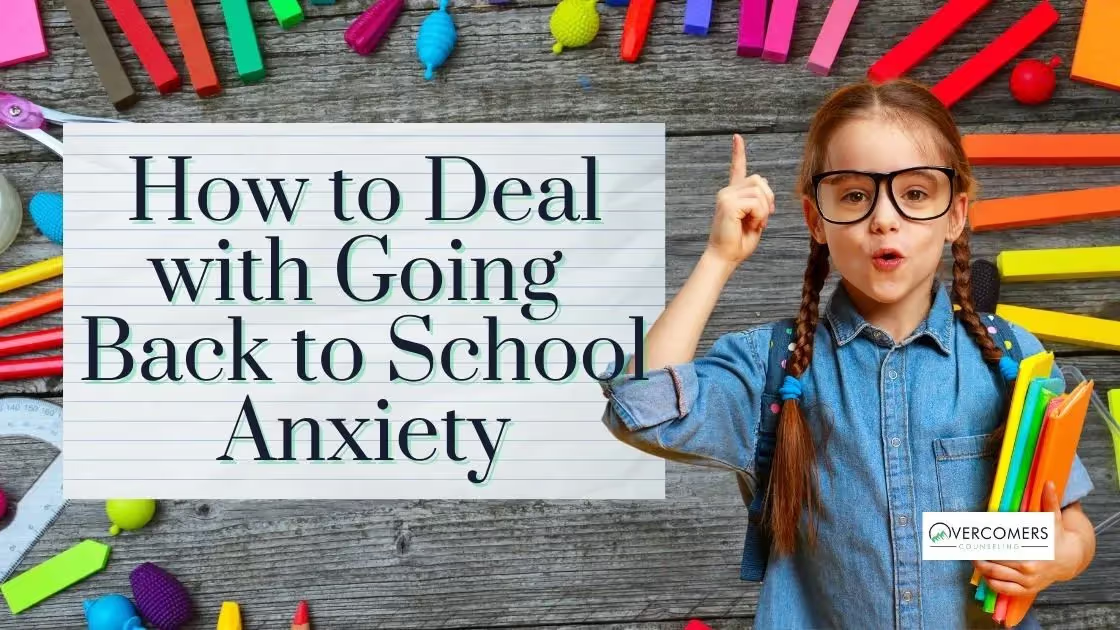Going back to school can be an anxious experience for young people. They may be worried about how they will do academically, how they will fit in socially,...

Going back to school can be an anxious experience for young people.
They may be worried about how they will do academically, how they will fit in socially, or how they will manage their time.
However, there are several things that parents and caregivers can do to help ease their anxiety.
The first step is to understand what is causing the anxiety.
This is important because it can help you figure out how to best support your child.
If the anxiety is coming from a specific fear, such as a fear of test-taking, then you can work on addressing that particular issue.
If the anxiety is more general, such as a feeling of being overwhelmed, then you can provide more general support and guidance.
Some other specific fears could be:
Once the source of the anxiety is identified, it will be easier to develop a plan to address it.
Additionally, it is important to remember that everyone experiences anxiety in different ways, so what works for one person may not work for another.
The most important thing is to be patient and understanding.

Once the source of the anxiety is identified, it is important to talk to your child about their worries.
This will help kids feel understood and supported.
It is also a good opportunity to offer reassurance and advice.
For example, if they are worried about how they will do academically, you can remind them of how hard they have worked in the past and how you know they will do great.
If they are worried about fitting in socially, you can give them some tips on how to make new friends, such as joining a club or sport.
It is also important to encourage positive thinking.
This means helping your child focus on the things that make them feel good about themselves and their ability to cope with anxiety.
A list of ways to encourage positive thinking are:
All of these things may help your child to feel more confident and in control.
Encouraging a positive way of thinking can help kids deal with going back to school anxiety.
Another way to help ease anxiety is to create a routine.
This can be especially helpful for children who worry about not being able to keep up with homework.
By creating a routine, you can help them to feel more organized and in control.
Some things that you can include in a routine are:
By having a set routine, your child will know what to expect and how to best manage their time. This can help to reduce stress and anxiety.
Another way to help ease your child's anxiety is to help them prepare for school.
This means making sure that they have all of the supplies they need and that they know how to get to their classes.
It can also be helpful to talk to their teacher or fellow students about what to expect in the upcoming year.
Other ways you can help them prepare for school are:
By helping them to prepare for school, you can help ease their anxiety and set them up for success.

Clubs, sports teams, and other after-school programs provide a great way for kids to socialize and make friends.
There are many benefits to getting involved in extracurricular activities.
Children can learn new skills, make friends, and discover their passions.
Plus, when they participate in extracurricular activities, they often have better grades and higher test scores.
In addition, participating in extracurricular activities can help boost kids' confidence and self-esteem.
As a result, getting involved in extracurricular activities is a great way to help kids deal with going back to school anxiety.
A good night's sleep will help them to feel rested and ready to face the new school day.
Ensure they are eating a balanced diet.
A nutritious meal will give them the energy they need to concentrate and learn.
Encourage them to talk about their feelings.
Talking openly about their anxiety can help to ease their fears and make them feel more prepared to face the new school year.
With a little preparation and support, your child can overcome their anxiety and have a successful school year.
If your child's anxiety is severe, it may be best to seek help from a qualified mental health professional.
A therapist can help your child to understand and manage their anxiety.
With the right support, your child can learn how to cope with their anxiety and have a successful school year.
The content in this post is not intended to be a substitute for professional medical advice, diagnosis, or treatment.
If you need help please talk to a professional who can help.
When it comes to how to deal with going back to school anxiety, there are a few things that you can do to help ease your child's anxiety.
Family members who transition back to school can sometimes be an anxious experience for children and parents.
You can create a routine, help them prepare for school, encourage them to get involved in extracurricular activities and make sure they get enough sleep and eat a balanced diet.
If the anxiety is severe, you may want to seek help from a qualified mental health professional.
With a little preparation and support, your child can overcome their anxiety and have a successful school year.
Other activities which have been found helpful in reducing both immediate feelings of anxiousness and long-term anxieties associated with chronic disorders include yoga, journaling, nature walks, art therapy, volunteering, and other low-stress activities. Additionally, developing a healthy lifestyle incorporating adequate sleep, physical activity, and nutritious meals can help reduce overall stress levels.
To reduce your anxiety, you can practice relaxation techniques such as deep breathing, progressive muscle relaxation, guided imagery, and mindfulness practices. Additionally, regular exercise has been found to be beneficial in managing stress and improving mental health.
Ignoring anxiety can exacerbate symptoms and make it more challenging to manage over time. This can result in a negative impact on your personal, professional, and social life, leading to feelings of isolation and even depression.
It's important that you feel comfortable discussing personal matters with your therapist in order to open up and get more out of therapy sessions; therefore finding someone who meets certain criteria like experience level, expertise areas, and personality is key when selecting a therapist who can give meaningful feedback about how best handle issues related to anxiety or other mental health concerns.
Yes, Medicaid provides insurance coverage for therapy services specifically designed to help individuals struggling with anxiety, depression, and other mental health conditions.
Addressing anxiety is crucial because it can significantly impact your quality of life and overall well-being. Left untreated, anxiety can lead to more severe mental health issues, relationship problems, and difficulty functioning in daily life.